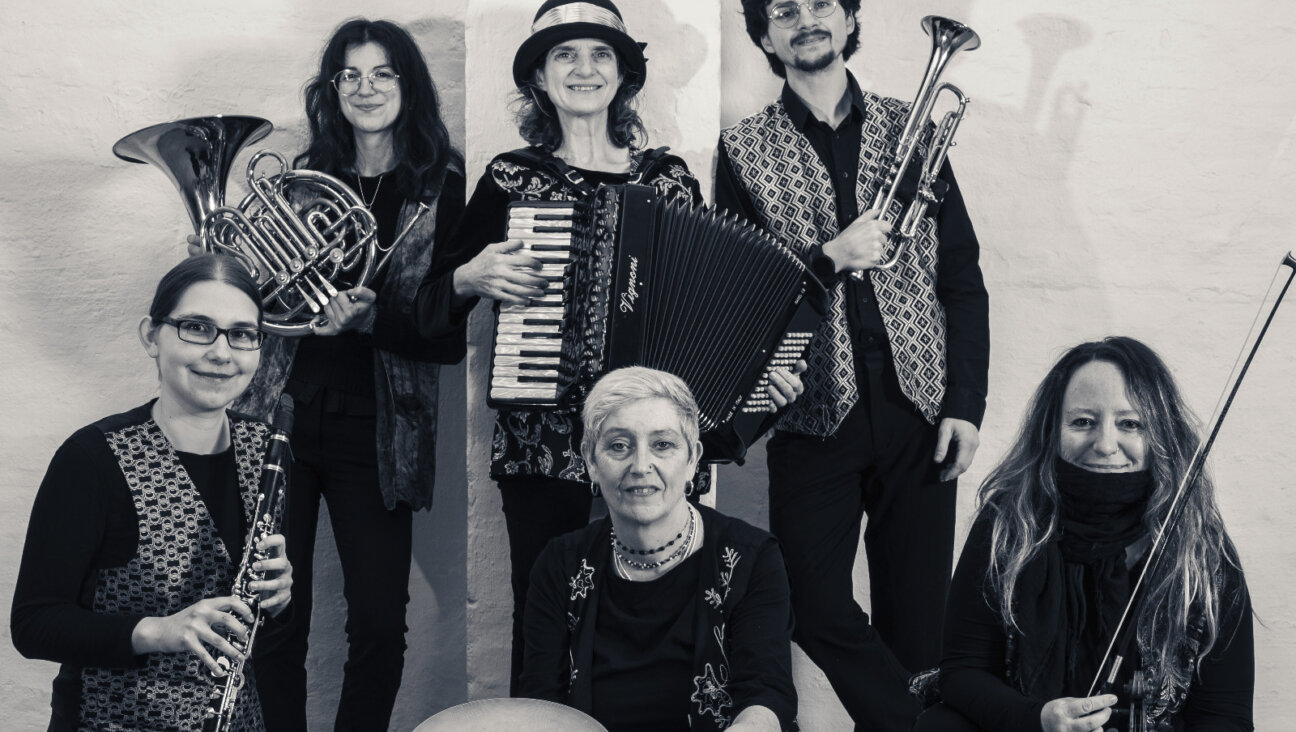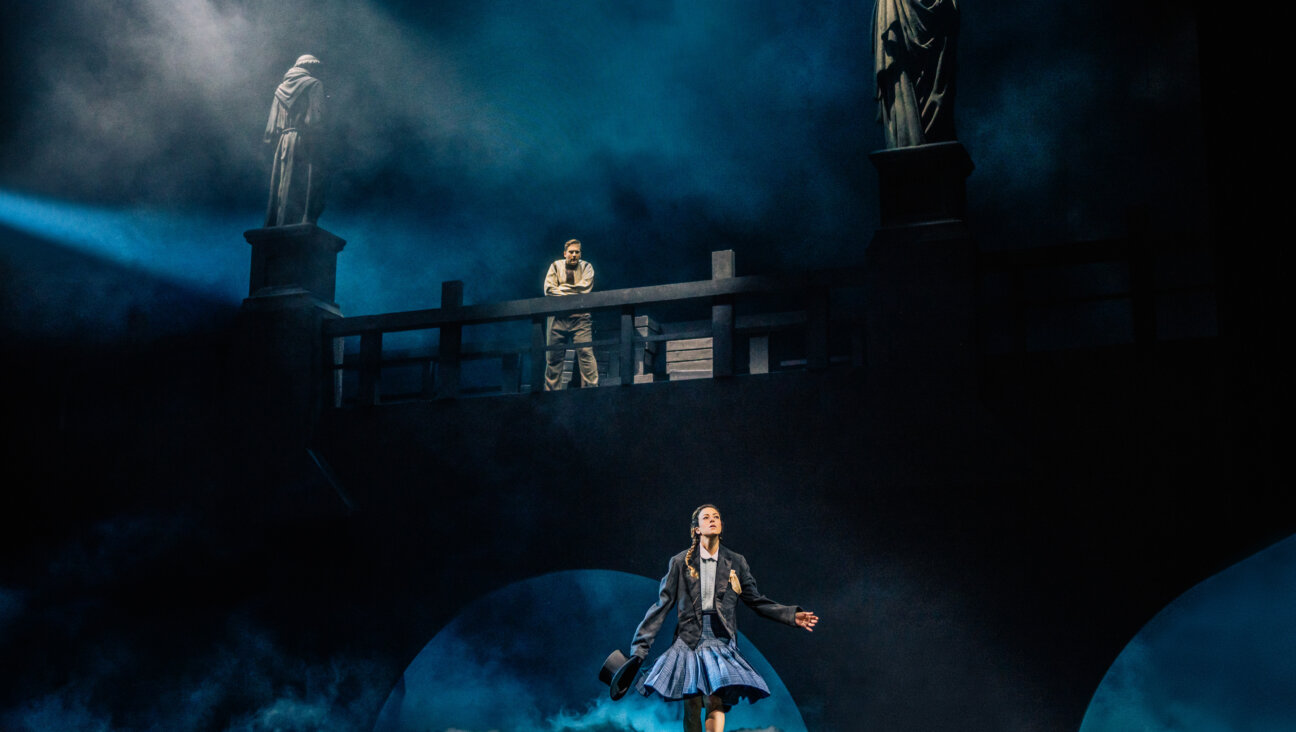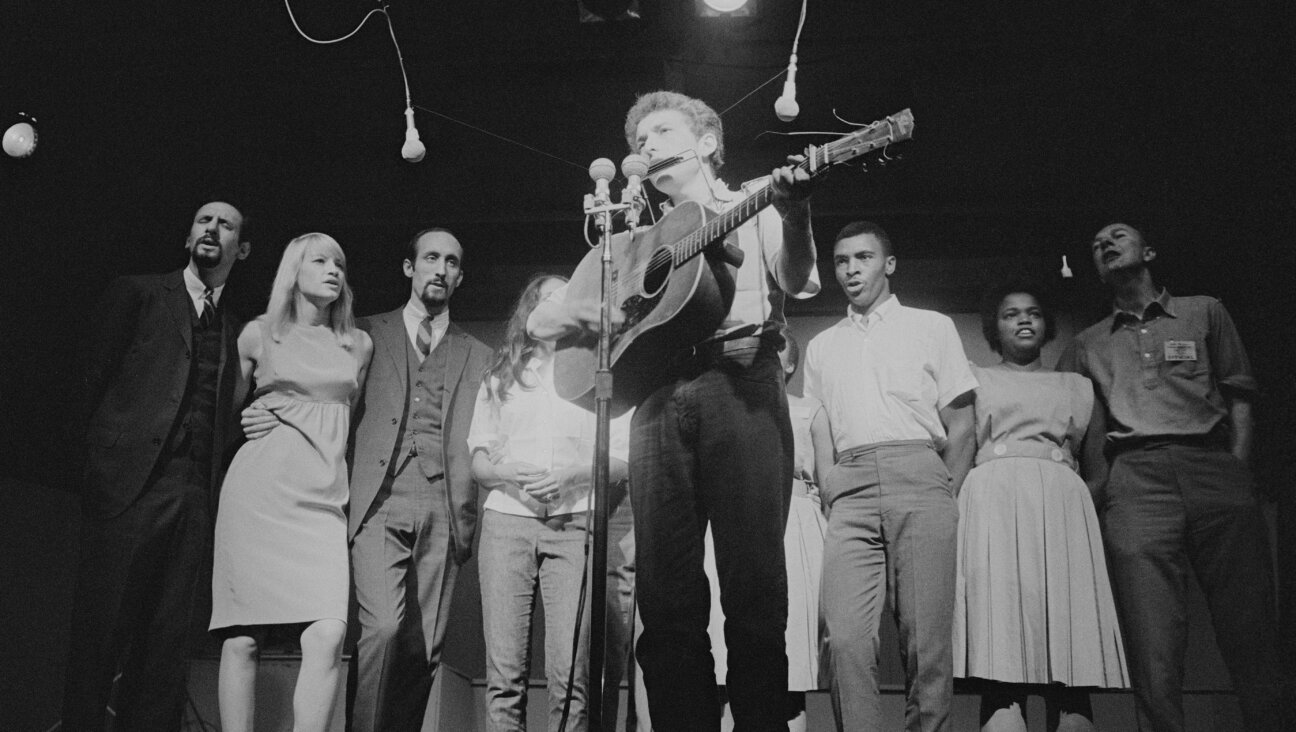How To Listen to Tchaikovsky While Looking Past His Anti-Semitism

Graphic by Angelie Zaslavsky
Editor’s Note: Peter Illyich Tchaikovsky was born on this day in May 7, 1840. Here’s a look at the brilliant composer’s complicated history:
When the conductor Semyon Bychkov arrived at a Russian-style cafe in midtown Manhattan to discuss the upcoming Peter Illyich Tchaikovsky festival at the New York Philharmonic, I handed the conductor a one-page document I’d found that morning that had unveiled a new Tchaikovsky for me.
It summarized two boxes at the Columbia University Rare Book & Manuscript Library with the papers of one Galina Nikolayevna von Meck. The form bore a biographical note for her: “Grandniece of composer Peter Illyich Tchaikovsky, and granddaughter of his patroness Nadezhda von Meck.”
Galina von Meck had translated hundreds of letters between Nadezhda von Meck and Tchaikovsky. Bychkov’s three-week festival based at Lincoln Center draws on the couple’s strange and illuminating relationship. During the years that Tchaikovsky worked on many pieces that will be performed in this series, the composer exchanged at least 1,100 letters with von Meck, the wealthy Russian woman who supported him through his most active years. An editor of the letters, which shed light on the composer’s personality and, in some instances, his anti-Semitism has written that Tchaikovsky’s tie to von Meck was “all-important to his survival.”
Bychkov — a Jew raised in the former Leningrad — has even used Tchaikovsky’s endearment for von Meck as the key to the festival’s name: “Beloved Friend — Tchaikovsky and His World.”
I told the conductor that I’d just started going through the translations and that they had opened my eyes to the fact that Tchaikovsky was a writer whose power to express himself in words mirrored his expressiveness with music.
“It is true,” Bychkov said, studying the piece of paper. “What we find in these letters is that the man who wrote the letters and the music are one and the same man, and this is something that is truly unusual. I haven’t seen it before. In other cases, you get the man and the music, and they are in some way different. But here, what you get is the same man, who is both the writer of letters and the composer of the music, and who is capable of being expressive and genuine in both.”
I met with Bychkov across a back table at the Petrossian Boutique & Café, on Seventh Avenue, just north of Carnegie Hall. There, I’d attended his rehearsal with the Royal Concertgebouw Orchestra of Amsterdam that afternoon, the day Bychkov turned 64. The orchestra had played “Happy Birthday” for him. From the podium he beamed at the players, and their sense of mutual good feeling extended that night to a performance of Mahler’s Symphony No. 5, which was notable for building the many parts of Mahler’s work into an integrated whole.
In place of the ferocity that characterized Leonard Bernstein’s approach, a living memory for many New Yorkers, Bychkov shaped the Mahler with the searching balance of force and delicacy that has made him one of the world’s most sought-after conductors.
At the Petrossian Café, Bychkov’s manner was easy, yet elegant. He has the most sympathetic face nature has put on a conductor since it made Pierre Monteux, a Frenchman with Sephardic roots who once also formed a closeness with the Concertgebouw.
Bychkov and I spoke a bit about Tchaikovsky’s influence on Mahler. The two had different kinds of Weltschmerz in their sensibilities. Mahler conducted some of the Russian’s work, but Bychkov focused on his affinity for Tchaikovsky’s “sincerity,” along with his sense that undue emphasis has been given to the composer’s emotional power at the expense of his “great power of intellect.”

Beloved Friend: Conductor Semyon Bychkov Image by Umberto Nicoletti
The meld of feeling and intellect is what gives the von Meck letters their force. Bychkov came of age in the former Soviet Union, where Tchaikovsky was a nationalist icon, and he speaks of the letters with a familiarity that most non-Russians lack. The correspondence commenced after von Meck reached out to Tchaikovsky in 1876. This began her annual support of 6,000 rubles, which gave him the freedom to compose instead of teaching or other musical wage earning.
Writing that she was a recluse who wanted to keep an idealized form of him in her mind, the widowed von Meck insisted that she and Tchaikovsky never meet in person. They never did, despite one or two sightings across 14 years of friendship.
The surviving letters number 768 from him to her and 451 from her to him. His letters to her contain frequent thoughts about his works, as well as opinions on Mozart (“I idealize him”) and other composers. But I was hit hardest by their picture of a composer clinging to discipline despite a kaleidoscopic array of anxieties, from the practical bedevilments of ballet and opera projects to worries about finding the time and quiet to work. They also show flashes of anti-Semitism. Writing von Meck in April, 1878 about a cottage where he’s staying, he writes of his unhappiness about a nearby Jewish village and his relief that “the Yids are not visible.” At one point, he refers to Benjamin Disraeli as “that detestable Jew.”
He refers more directly to his sexuality in other sets of letters, but in several of the von Meck letters he writes with agonized clarity about his failed marriage with a woman admirer. In many ways, Tchaikovsky the writer gives a view that few people have had of the composer represented by Bychkov’s festival.
In New York, the programs of the “Beloved Friend” festival, which begins on January 24, will include Philharmonic members and guest soloists in over 15 separate works. The orchestra will play in David Geffen Hall, but there will also be a chamber music recital at the 92nd Street Y with Yefim Bronfman in Tchaikovsky’s Piano Trio, and a performance of Rachmaninoff’s Vespers at the Church of St. Paul the Apostle, near Lincoln Center on 59th Street. Symphonic works will include those by Tchaikovsky, composers he influenced and others who influenced him, among them Mikhail Glinka.
Bychkov will give a talk exploring how the von Meck letters and other sources reveal what he calls the “genetic” background of Tchaikovsky’s music. No example of this is as dramatic as that of the Piano Concerto No. 1. The festival’s soloist for the piece will be Russian-born pianist Kirill Gerstein, who spent years in the United States studying jazz and classical piano but now lives and teaches in Germany. He’s delivering a news-making part of the festival, giving the first performance in New York of the newly public, most authentic version of a piece that first made many listeners aware of classical music— it was adapted into a popular song called “Tonight We Love” in 1941 and was recorded by Van Cliburn after he won the International Tchaikovsky Piano Competition in 1958
The work as most people know it actually came from an edition containing significant changes made by editors after Tchaikovsky’s death. In 2015, Gerstein wrote a deep-diving analysis for The New York Review of Books about the work’s history, detailing how three drafts evolved and why the third and most familiar one probably betrays Tchaikovsky’s wishes, while the one from 1879 — which Tchaikovsky conducted for the 1891 opening of Carnegie Hall, on his one trip to America — is the truest.
The article was published with a link allowing readers to compare the opening bars of the two concertos — where the most obvious difference occurs. Instead of the finger-spreading, heroic chords that made the first measures a long-standing sensation, we get delicate arpeggios. Gerstein told the Forward in an interview that it’s what the composer wanted, and that “the composer’s intention is our salvation and it is our role as interpreters to make it convincing.”
The extent to which betrayal marks the concerto’s story probably wouldn’t be known if it weren’t for a letter that Tchaikovsky wrote von Meck early in 1878. He re-creates the storm of feelings he experienced when he showed an advanced draft of the concerto to his friend Nikolai Rubinstein, a Jew who converted to Christianity.
Rubinstein listened to Tchaikovsky play it — then savaged it. Tchaikovsky wrote von Meck about the “torrent of words” in which Rubinstein declared that “my concerto was no good, that it was impossible to play, that some passages were hackneyed, awkward and clumsy beyond redemption, that as a composition it was bad and banal, that I had pilfered this bit from here and that from there, that there were only two or three pages which would do, and that the rest would have to be either discarded or completely reworked.”
It’s a unique horror story of an artist’s misplaced trust in a friend-as-critic. “I am no longer a small boy trying his hand as a composer,” Tchaikovsky writes. “I don’t need lessons from anybody, especially expressed in so acerbic and hostile a manner.”
He defied Rubinstein:“I won’t alter a single note, and I shall have it printed exactly as it is at the moment.”
Still, right after sharing those scenes, Tchaikovsky turned around and wrote sympathetic lines to von Meck about Rubinstein as a “personality worthy of complete sympathy,” musing on the expansiveness needed to deal with people in general, saying it is probably better to “remember that to reproach people for the evil they do us, to dwell on it, to delve into the reasons for their malicious actions, is not worth the trouble and is unworthy of people who know how to look on the sickness of the human soul with magnanimity.”
Passages like these are what make Tchaikovsky’s anti-Jewish bigotry so startling. In a book called “Tchaikovsky In America,” which recounts the composer’s visit to America and quotes a Tchaikovsky diary excerpt in which he writes of his disgust at souvenir salesmen in Niagara Falls — “leeches” whose “importunity and impudence” would have been “incomprehensible” unless he determined by looking at them “that they were Jews.”
I was first entranced by Tchaikovsky’s art as a teenager performing the Fifth Symphony — Bychkov will conduct it in the festival — as a flutist in a youth orchestra. The fluid way Tchaikovsky wrote for the flute, which he studied in his youth, enhanced my delight in the joyous force of the piece. Maybe that’s why his letters and diary elicited such dismay at the anti-Semitism that paradoxically came with his admiration for certain Jewish artists. His most influential teacher was undoubtedly Rubinstein’s brother, Anton Rubinstein.
The challenge of separating a composer’s art from his personality is more familiar to Jewish admirers of Wagner than to those of Tchaikovsky. Yet the question applies especially to this festival, which could be subtitled “Tchaikovsky in a Jewish World.” The Russian-born Yefim Bronfman is Israeli. Gerstein, also Russian born, has self-identified as an American Jew. Bychkov, who immigrated to the United States in 1975, belongs to a Russian Jewish family.
I quoted passages that disturbed me in my interviews with Gerstein and Bychkov. Gerstein, much like Bychkov, told me he grew up “in an environment where familiarity with the von Meck letters and other writings by and about Tchaikovsky would have been an expectation.” Of the composer’s anti-Semitic side, he said, “One gets used to being dismissive of it and not getting stuck on it.” He added, “I don’t imagine he was a passionate and convinced anti-Semite the way Wagner was.”
Bychkov made the same comparison: “If I can reconcile myself with Wagner and his music, then it is infinitely more easy with Tchaikovsky. Tchaikovsky did not publish an essay called ‘Judaism and Music’ (‘Judentum in der Musik,’ a landmark in German anti-Semitism), and Wagner did a lot of other writings that were pathological. Tchaikovsky was not a pathological anti-Semite at all. He was a complex man and — as with complex men and
women — there are things about him you would not want to emulate, but my love for Wagner’s music is unconditional, and my love for Tchaikovsky’s music is unconditional.”
Speaking of conditions, I asked why the festival has omitted the Symphony No. 4, the one that Tchaikovsky dedicated to von Meck, and the single piece the two of them write about most often. “Our Symphony made exactly the right impression on me,” she wrote the composer after she heard it. “The first movement affected the heart with its profound terrifying despair — what a theme it has, what a daring sequence of chords (it electrified me), what a concluding section; it’s so good that you could take leave of your senses.”
Bychkov explained its absence by saying he used the letters as a concept but also made a priority of doing less familiar work, like the Manfred Symphony, to which I found no reference in the letters.
Both the von Meck letters and Tchaikovsky’s life ended in layers of mystery. In the late 1880s, von Meck wrote back less often, and then Tchaikovsky got a letter in 1890 that, with no warning, ended both his allowance and the correspondence. She wrote that she faced financial problems, adding: “Goodbye, my dear, incomparable friend. Do not forget one whose love for you is infinite.”
Tchaikovsky’s replies ended in confusion, and with a suffering on his part that is said to have dogged his last days. Just how he died — near the end of 1893 — still remains uncertain.
According to one story, he committed suicide by swallowing poison. His brother Modest Ilyich Tchaikovsky reported, in a biography he wrote, that he died of cholera. Roland John Wiley concludes “Tchaikovsky,” his fine 2009 biography from Oxford University Press, by writing: “We do not and probably never will know beyond a doubt the cause of Tchaikovsky’s death.” Von Meck outlived him by only a few months, dying in 1895 from tuberculosis of the larynx.
Allan M. Jalon’s previous articles for the Forward include ‘Paul Newman’s Lost Masterpiece and How We Rediscovered It.’
The New York Philharmonic’s festival ‘Beloved Friend: Tchaikovsky and His World’ runs through February 11. For a complete listing of events, contact www.nyphil.org
















